The first gameplay footage from Jedi: Fallen Order dropped recently, and it was…well, if I had seen it when I was twelve, I would have been very excited for this game. Most of the issues I have are things that you can see anywhere else on the internet, issues with out-of-date mechanics and unengaging combat. Instead, here, I wanted to talk about something different, how the game seems lackluster as a Star Wars story.
The developers have made a few things very clear about the game. It is a linear, story-driven, Jedi action adventure RPG about a Padawan who survives Order 66. A story we’ve all heard before—but just because you’ve heard it before doesn’t mean you can’t explore it from a new and exciting angle. You could explore the conflict between the dark and light as it relates to what he must do to survive conflicts with his Jedi teachings.
Except, they aren’t. The devs have said there is no light/dark moral system. There are no consequences to running into every situation swinging your lightsaber like a madman. It sounds like the game pretty much forces you to play that way. The devs also say they liked that the character was on the run because it meant that they could have you go into situations and kill without thinking about it. So rather than using the moral dilemmas involved in being a Jedi forced to fight stormtroopers who are essentially lawmen doing their jobs, we ignore that and go straight to being an indiscriminate killer.
The thing that puts me the most off of this game is the use of the Force in the trailer. For someone who never even completed their Padawan training, you do some crazy things with the Force: picking people up with your mind; running faster than blaster fire; even stopping blaster bolts in midair. Abilities we have seen used rarely, and when they are used, it’s by incredibly powerful individuals.
So why does this game have a Padawan that is freely using powers that most Jedi Masters struggle with? Simple, the game is a power fantasy. Most video games are power fantasies, with the story written around the fantasy rather than a story being written, then a game built around the story. There is nothing wrong with this; I’ve never complained about any game doing it before, so why does it rub me the wrong way when this particular game is a power fantasy? Is it possible that the Jedi and the Force are anti-power fantasy?
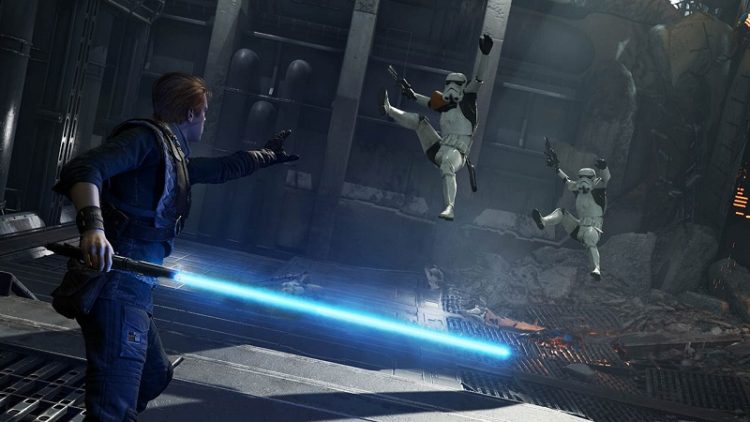
It’s not like this is the first Jedi action adventure game, there have been quite a few. All of them were part of the lore at one point; were they not power fantasies as well? What do they have to say about the Force’s relationship to the Jedi?
The best place to start looking at Jedi video games is with the Jedi Knight franchise. A game series entirely centered around being a Jedi in conflict with the Empire, much like Fallen Order. The way the Jedi Knight games treat Jedi and their relationship to the Force is best summed up by Obi-Wan in A New Hope: “The Force is what gives a Jedi his power. It’s an energy field created by all living things. It surrounds us and penetrates us. It binds the galaxy together.”
In the context of the Jedi Knight games, the Force is the universal energy field that Obi-Wan describes. Jedi draw power from it and manipulate it, but it has no identity outside of that. It’s a law or aspect of the universe like space-time or gravity. The use of the light (or dark) side is about how one draws their power from the Force. Dark side users use their anger and hatred, the power corrupting them the more they use it. Jedi draw it from discipline and compassion.
Another game series about Jedi is the Knights of the Old Republic franchise. Here you get the first video game to have anything real to say about the Sith and the Jedi’s conflict outside the context of the Galactic Empire. This series is the purest RPG of the bunch, focusing almost everything around making moral choices that have consequences in the game world, as well as leveling up your character and choosing abilities that make you more powerful.
Experience points and leveling up are a mechanic in both the KOTOR and Jedi Knight games. While it is there mainly to motivate character and create variety in gameplay styles, it does actually impact the way the Force works in a broader sense that has affected novels and other stories as well.
The idea that the more you fight with a lightsaber and the more Force powers you use, the stronger you become, is a part of the player’s experience. So even though it is there primarily to make the game fun, it does create this in-universe idea of Jedi training to be stronger in the Force. They lift bigger and bigger things with their Force muscles, and eventually, they can bring down starships. The more mean things you do, the more powerful your “mean powers” are. The more nice things you do, the more powerful your “nice powers” are.
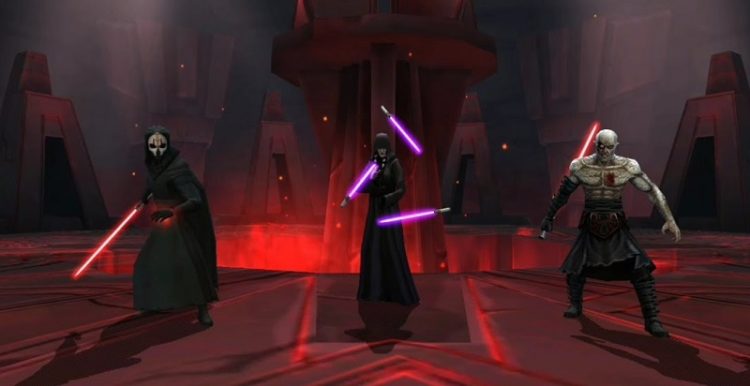
In Knights of the Old Republic II: The Sith Lords we see some of the most incredible uses of the Force in all of Legends. We get to see three of the meanest meanies in the galaxy, and see what the benefits are of being so mean. We get a Sith Lord who can sap whole planets of their life essence, a Sith Lord who is literally too pissed to die a la Clockwerk from Sly Cooper, and a Sith Lord who can use the Force to wield six lightsabers at once.
And of course, we cannot talk about incredible uses of the Force without talking about The Force Unleashed. I remember when this game was coming out, I followed the development religiously—watching all the interviews and the behind-the-scenes discussions.
The things you could do with the Force in TFU were insane. Mowing down hundreds of stormtroopers in minutes, even pulling a Star Destroyer out of the sky. But for a game called The Force Unleashed where the developers’ slogan was “kicking ass with the Force” the game says next to nothing about the Force, the source of this awesome power.
The game focuses much more on the relationships between the characters, specifically Starkiller and his master Darth Vader, than on the Force itself. Even the conflict between the dark and light that’s present in almost every Star Wars story is rarely brought up. The main character only ever acts out of personal interest rather than out of a desire for power or to serve the dark or light. Even the different good and bad endings don’t really involve a moral choice. The game is about as much of a power fantasy as you could imagine.
The image of the Force across all these games is pretty clear: an amorphous energy field, generated by the ebb and flow of life in the universe. To be a Jedi or a Sith is to tap into this ebb and flow, and use it as a source of power, for good or for ill. These ideas are consistent across the rest of Legends as well, whether it’s Palpatine summoning giant Force storms that can destroy fleets or Luke achieving oneness with the Force and moving so fast it looks like he’s “wielding thirty lightsabers at once”.
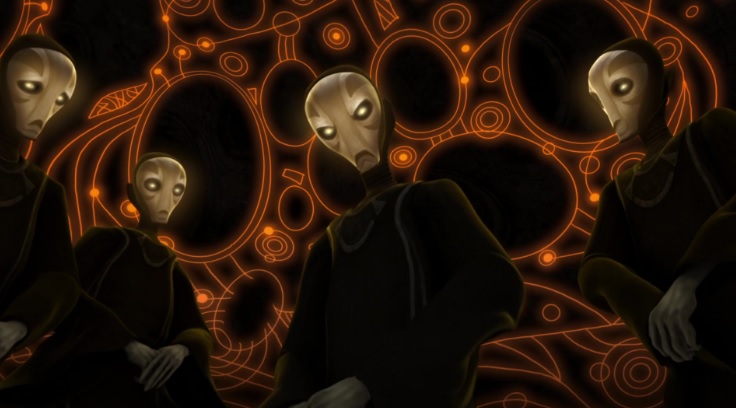
That was the Force according to Legends. Canon, however, gives a very different version of the Force. Across the comic books and novels of the canon, you can see the Force defined differently. Charles Soule’s Darth Vader: Lord of the Sith, Jason Aaron’s Yoda’s Secret War, even briefly in James Luceno’s Tarkin. Here you see the Force as the same universe-binding energy field, but it has an identity of its own.
The Force in canon has a “will”, and it directly guides Jedi and Sith to do things and act on its behalf. “Balance” is a goal the Force actively seeks to achieve. And it is so much deeper than the material realm on which the Jedi and Sith exist.
You also see this in the TV shows, The Clone Wars and Star Wars Rebels. We see embodiments of insane power like the Bendu, the Mortis gods, the Force Priestesses, and the World Between Worlds. Beings and realms which the Jedi can barely comprehend, that are above the conflict between the light and the dark and have a much more complex comprehension of the Force that we couldn’t even begin to understand—to the point of Yoda being shown the death of the Jedi, and asked to do nothing to stop it, because it is the will of the Force.
The canon understanding of training and how to become more powerful is also very different. Training isn’t about building up Force muscles; it’s about focus and discipline. It’s leaning into the wisdom and knowledge of the Force without letting its more destructive aspects overtake you.
Even many of the villains in canon act more out of service to the Force than their own evil plans. Lord Momin is an artist who wants to build eternal sculptures to the dark side. Even Palpatine, with all his evil plans and machinations, builds his Empire only as a step toward entering a more metaphysical plane of existence, creating a self-sustaining government so he can focus on becoming one with the dark side. When he talks it’s his Empire, his plans and machinations, but it’s the power of the dark side.
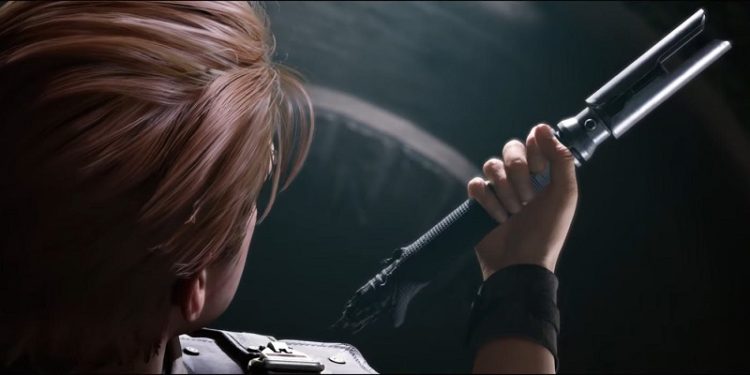
This paints a different picture of what it means to be a Jedi. Being a Jedi is about tapping into the ebb and flow of the universe, yes, but not to use it as a source of power. It’s about working alongside the ebb and flow and acting on its behalf. The largest feats of the Force are not performed by mortals who trained really hard to get there, but by cosmic beings and places that show us the Jedi and Sith are but a small window into a much larger reality.
Now I in no way mean to say one philosophy is better or worse than the other. I am simply pointing out that these are two different attitudes toward the Force that change based on what story is being told. You can even see these two philosophies go up against each other in the films. Qui-Gon’s conflict with the Jedi Council is because he prioritizes the will of the Force. Anakin prioritizing his desires over the will of the Force is what pushes him to join the dark side.
In Legends, there are tales that talk about the Force both ways, but the canon has a clear focus towards pushing the Force as an entity who acts of its own will and not just the will of others. Which bring us back to Jedi: Fallen Order.
Why does any of this matter? Because at the very least your story should follow the rules of the universe it’s set in. An excellent example of this is the game’s attitude toward growing stronger in the Force. In interviews the devs talk about having a system where you level up and get new abilities through skill points. This contradicts the canon understanding of training; power is about your state of mind, not working out your Force muscles.
This would be more acceptable if it made sense as a game mechanic, but it doesn’t—having a system where you level up and get different abilities as you level up is about making unique experiences for each player. According to the devs themselves, the game has no character customization, no moral system, and only one gameplay style (swinging your lightsaber like a maniac). Meaning there is no effort being made toward creating those unique experiences.
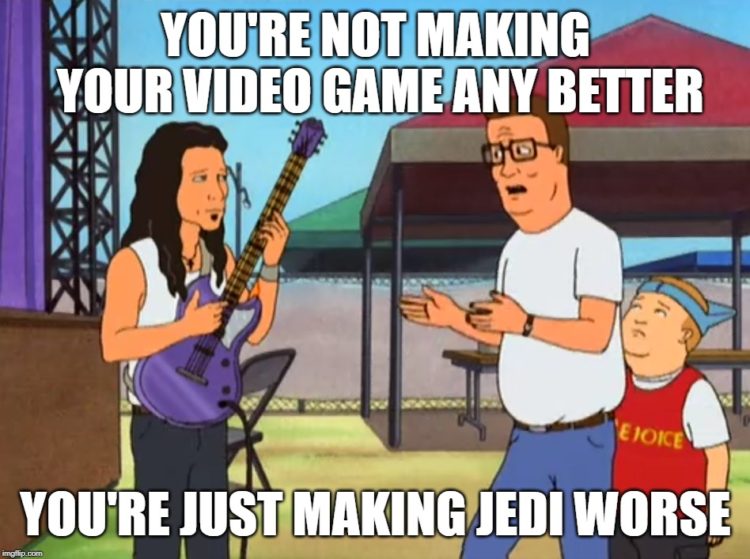
So the level system doesn’t make sense mechanically, and more importantly (depending on who you ask) it doesn’t make sense in-universe. That’s not to say that you shouldn’t gain new abilities as the game progresses, but given the canon understanding, you should gain these abilities during key points in the story, as your character achieves new insights.
It doesn’t even really function on the level of the old canon because you aren’t getting more powerful by being a better Jedi, and the devs have said there isn’t any danger of turning to the dark side. So essentially you have a game where you get to be a really powerful Jedi, with no consequences derived from actually acting more or less like one.
What I am trying to get at is this: one of the biggest benefits of the new canon is that there are shared themes and consistent ideas that stay shared and consistent across stories. If this game was directly contradicting those ideas to make us think about them, great. But it feels like the devs only contradict the canon treatment of the Force because they don’t care. They aren’t saying the Force should be part of the threads that weave into the fabric of the universe, but they also aren’t saying there’s a conscious-willed Force in the universe that is far beyond comprehension. They’re saying it’s just an excuse to do cool magic stuff. So if they don’t care to make a statement with their story, I don’t see a reason to care about the game.
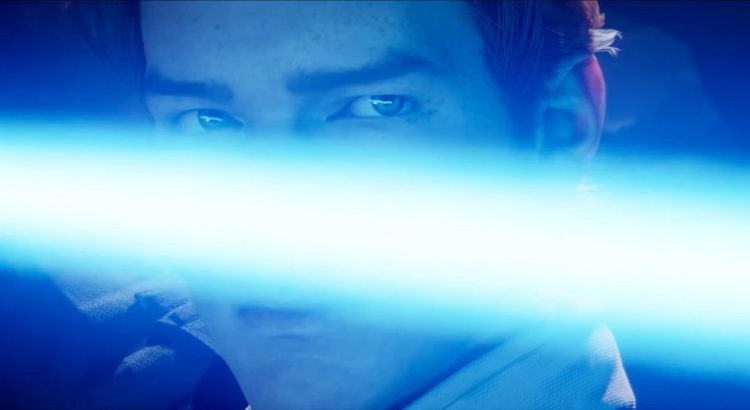

Fantastic Article. Just well done.
“Even the different good and bad endings don’t really involve a moral choice.”
I actually think that the first The Force Unleashed game had one of the best Dark Side/Light Side endings, because the choice between them is not some arbitrary tallying up of your “good” and “bad” decisions over the course of the game, nor is it your character deciding to be evil all of a sudden thanks to a button prompt. Both endings feature Starkiller fighting the Empire, but what changes is his focus. In the Dark Side ending, he prioritizes his personal hatred of the Empire over the greater good by attacking Vader in the name of revenge instead of focusing on saving Bail Organa and the other rebel leaders. He’s being selfish, but it is a selfishness that looks like heroism from the outside. TFU’s Dark Side ending is the protagonist trying to destroy the Empire by killing a guy, while the Light Side ending is about saving others even at a personal cost. “Saving what you love instead of destroying what you hate” as it were. I find this to be much more insightful into the nature of the Light Side and Dark Side than the player deciding whether to conquer or not conquer the galaxy, because it actually gets at the heart of the Dark Side and why it can tempt even well-intentioned people. It is also a good mirror of Luke’s choice in Episode VI, where he decides not to kill Vader even after all of the terrible things Vader has done, which is THE Light Side thing to do. Not denying that the game was completely an over-the-top power fantasy, but that ending still had a good insight into the Force, in my opinion.
…The second Force Unleashed game’s two endings were disappointing, though, because they didn’t really have anything to do with the choice you were making in the same way the first one was.
Great article! I confess that so far I am not very excited for Jedi: Fallen Order, for some of the same reasons you explain here.
One video game that pushes a little bit this tendency is the lightsaber mechanic in Star Wars Battlefront II. There, if you are a lightsaber-wielding hero, and you smash buttons and “swing like a madman”, your stamina bar will run low and leave you open to counterattack. So instead, you must prioritize defense, dodging, and creativity in order to defeat opponents (to an extent). Moreover, the story in the BF2 Campaign emphasizes the power of choices, with a great redemption arc for Iden Versio and Del Meeko. It’s not a perfect game by any means, but in my opinion it does do a pretty good job incorporating the Force in a more canonical way.